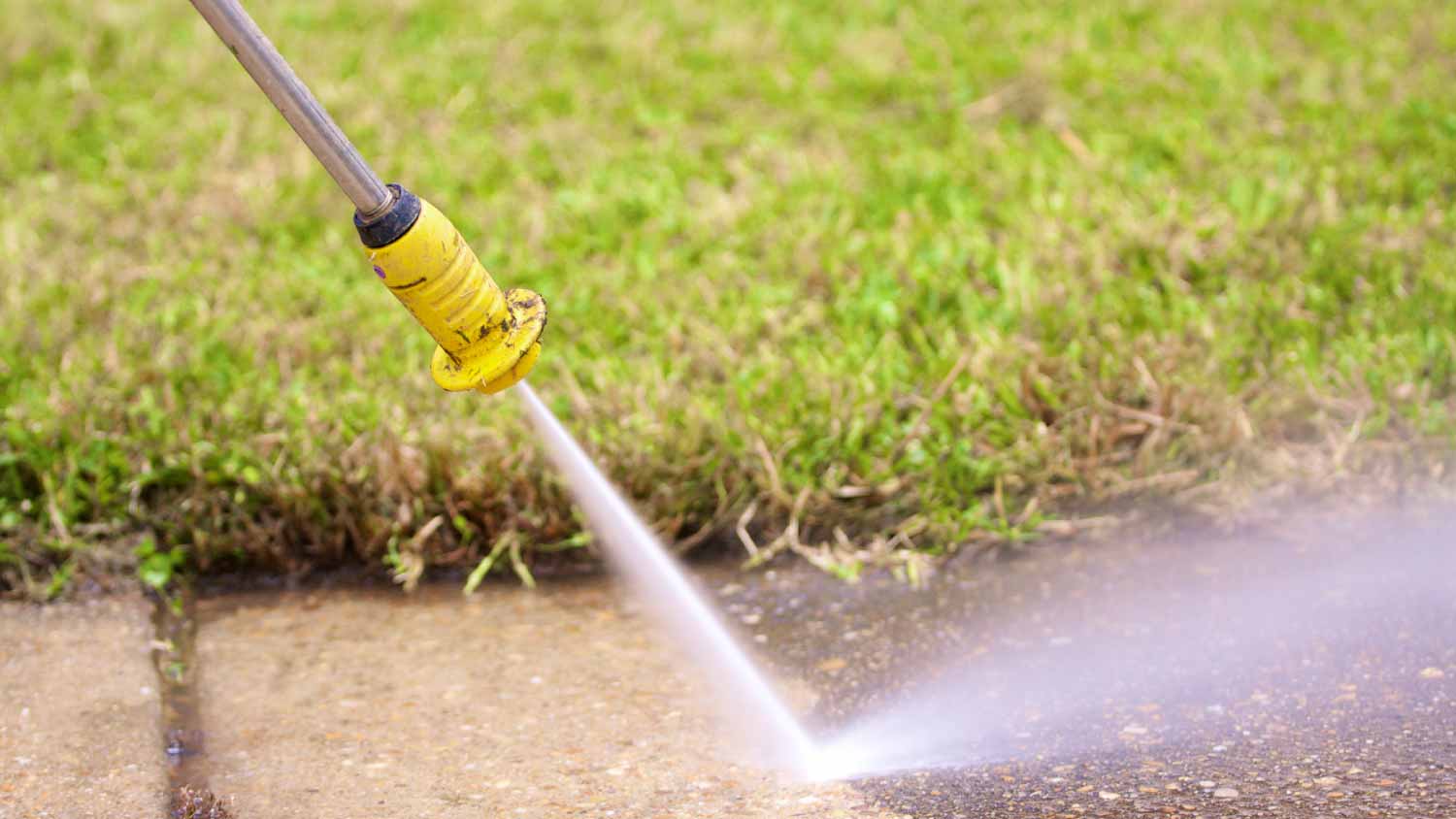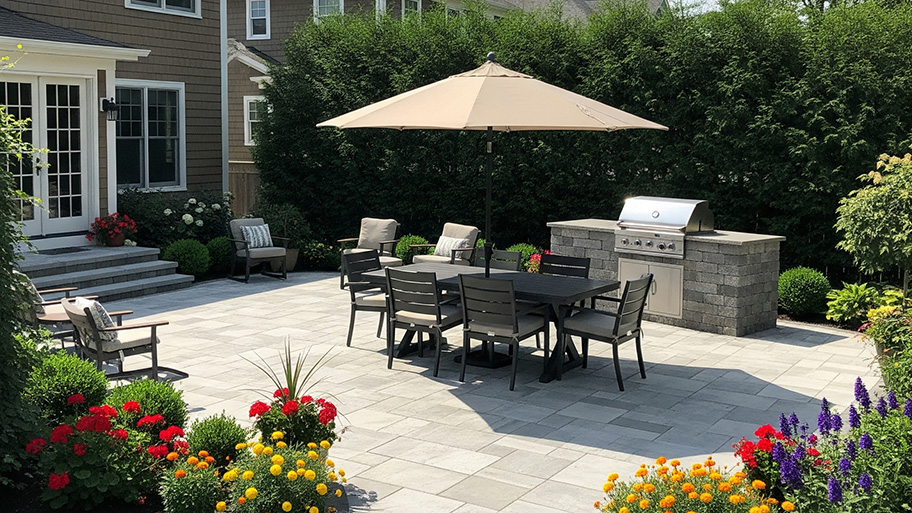
The cost to pressure wash a deck depends on its size, condition, material, and whether you DIY the job. Help set your budget with this cost guide.
Take the pressure off finding the right nozzle with these tips


Hiring a professional power washing company can save time, prevent damage, and ensure the right nozzle matches your task and surface.
The cost to rent a pressure washer averages around $90 a day, not including accessories or extra utility costs.
Although quick-connect nozzles are more versatile, turbo nozzles handle tough stains and paint removal more efficiently.
Most nozzles attach quickly, though turbo or specialty types may need extra skill or care for safe use.
Green nozzles are popular for general cleaning, while red and yellow are preferred for high-pressure spot work on hard surfaces.
A pressure washer is a handy tool to have around the house to tackle tougher cleaning tasks or more hands-on DIY projects. But it’s not as easy as just turning it on and spraying. There are a handful of types of pressure washer nozzles to consider, plus other pressure washing tips to keep in mind to make sure the job flows as easily as possible.
Keep reading to learn more about the types of pressure washer nozzles to find the right choice for your project.

Quick-connect nozzles are more common than turbo nozzles as they are more versatile, easier to connect and deploy, and more economical. They’re color-coded depending on the angle of the spray, in colors like red, blue, or black. This designation doesn’t necessarily define other factors like PSI or gallons per minute (GPM), just the angle of the spray. Those factors are typically dictated by the washer itself.
Turbo nozzles, also called rotary nozzles, are up to ten times more powerful than a traditional pressure washer nozzle—making them a better choice for tougher stains or jobs like stripping paint. Some are designed for specific tasks, like deck cleaning, to help homeowners do the job themselves rather than paying a professional a higher cost to pressure wash a deck.
We’ll break down the five colors of quick-connect pressure washer nozzles below.

With a 0° spray angle, the red pressure washer nozzle is the most powerful, targeted option available. The concentrated spray is reserved for hard, non-porous materials like concrete or metal and should not be used on wood or siding.
With such a small stream of water, the red nozzle is best for smaller, tougher stains needing extra power. If the stained spot is larger, consider a yellow nozzle, as the red could take a while to clean the entire area.
| Pros | Cons |
|---|---|
| Small, concentrated stream | Can’t be used on wood surfaces |
| Targeted cleaning for tough spots | Not ideal for any type of siding |
| Can reach further distances | Will damage softer surfaces |
Best for: Spot-cleaning extra-tough stains on non-porous surfaces.
Yellow nozzles are wider than red with a 15° angle but still offer a lot of power. The wider angle makes it a better choice for materials like wood or thinner metal (like on a grill), but still requires a bit of attention to avoid unnecessary damage. This is especially true if working with painted surfaces or wood.
If using a yellow nozzle on these types of materials, stand further away and make sure you don’t hold the water spray too long in one area to avoid over saturation and damage. But when used correctly, a yellow nozzle does a great job at tackling caked-on dirt or grime, especially on construction or farm equipment.
| Pros | Cons |
|---|---|
| Can be used on most materials | Not ideal for painted surfaces |
| OK on siding | Can’t use up close on treated surfaces |
| Can use on equipment | Requires caution when working with wood |
Best for: Cleaning or preparing an unpainted surface.
Green nozzles spray at a 25° angle, covering a broader surface area while still packing a punch in terms of pressure. If you’re unsure what nozzle to use, green is typically a good choice as it lands right in the middle regarding scope and intensity—especially if you’re using the pressure washer to clean something.
For example, if you want to clean your gutters with a pressure washer, the green nozzle is an excellent choice for any stuck-on grime or harder-to-reach areas. But, if you are simply trying to wash away soap or detergent, a white or black nozzle is likely a better choice.
| Pros | Cons |
|---|---|
| Gentle, yet effective, cleaning method | May mark soft surfaces if used up close |
| Great for clearing debris | Not as focused as some colors |
| Standard choice for most use cases | Narrower than other cleaning sprays |
Best for: General cleaning for most surfaces.
The white and black nozzles are often considered soft-washing nozzles. When deciding between soft washing vs. pressure washing nozzles, ask yourself this: Can my surface handle a concentrated stream of pressure? If the answer is no, consider soft white or black nozzles.
A white nozzle sprays at a 40° angle and is suitable for most surfaces, regardless of density or porousness. But that also means it won’t be as concentrated or impactful as some of the smaller angled nozzles.
| Pros | Cons |
|---|---|
| Good for most surfaces | Won’t clean stuck-on grime |
| Won’t strip paint when used correctly | Doesn’t spray detergent |
| Safe for vehicles | Not as wide as black nozzles |
Best for: Softer or more delicate surfaces, like painted decks.
Black nozzles offer an extra wide, low-pressure angle at 65°. It’s sometimes referred to as a detergent nozzle, as it can also be used to apply and distribute soap in conjunction with water. Out of all the types of pressure washer nozzles, black is the only one that works with the built-in soap dispenser.
The wider flow of water combined with soap makes it easy to clean a wide variety of surfaces and areas efficiently and effectively. After applying the soap, you may find it easier to switch to another nozzle type, like yellow, to finish the rinsing process.
| Pros | Cons |
|---|---|
| Safe for every type of surface | May take a while to rinse fully |
| Made to work with built-in soap dispenser | May require the use of another nozzle |
| Widest angle available | Only offers up to 500 PSI |
Best for: Applying and washing away soap or detergent.
While pressure washing is fairly straightforward. there are a few pressure washing mistakes that can end up costing you more time and money in the long run—like applying too much pressure or using the wrong nozzle. Because pressure washers discharge water at a shocking several thousand pounds of pressure per square inch, you risk damaging surfaces or accidentally breaking other items nearby if handled incorrectly.
And sometimes, the cost of renting a pressure washer (about $90 a day) plus paying for any accessories and dishing out the higher cost on your utility bill can add up quickly. In that case, it may make more sense to hire a professional instead.
This is especially the case if the job requires specialty tools or skills or requires getting on a ladder. The risks associated with doing it yourself, especially if you’re inexperienced, are likely not worth it. Instead, hire a professional power washing company to rinse the risk from your shoulders and put it in the hands of an expert.
From average costs to expert advice, get all the answers you need to get your job done.

The cost to pressure wash a deck depends on its size, condition, material, and whether you DIY the job. Help set your budget with this cost guide.

Pressure washers can help you keep your home looking great. Use this guide to learn how much it costs to rent a pressure washer based on factors like type and time.

The cost to pressure wash a patio depends on the size of the surface and the type of patio you have, as well as whether you DIY or hire a pressure washing pro.

PSI measures water pressure in pounds per square inch. GPM measures water flow rate in gallons per minute. Learn more about the difference.

Rain won’t clean the outside of your home, but pressure washing can. Here’s 10 reasons you should add pressure washing to your routine maintenance.

Gutters need routine cleaning at least twice a year. Put away the elbow grease and learn how to safely clean your gutters with a pressure washer.